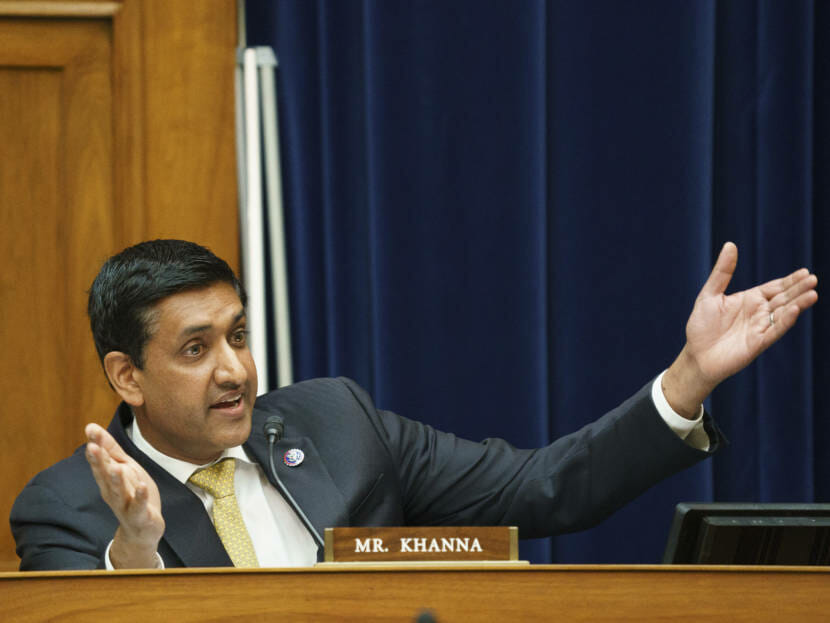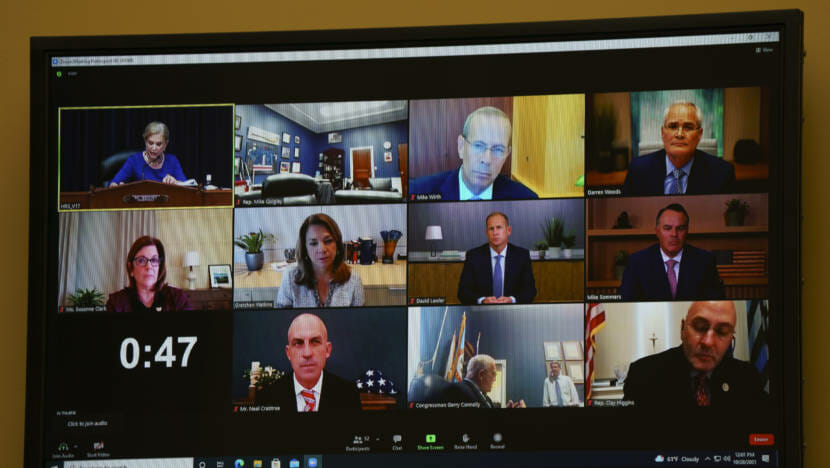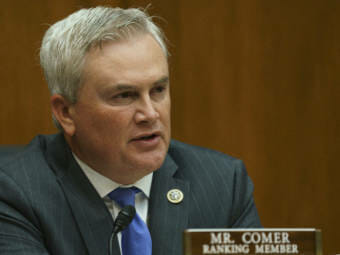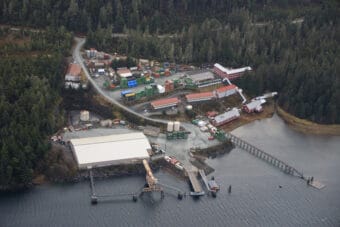
There were tense moments in a House Oversight Committee hearing Thursday, where executives from the world’s biggest oil and gas companies took questions about their role in the climate crisis. It’s the first time all were testifying together.
Rep. Carolyn Maloney, D-N.Y., who chairs the oversight committee, compared the hearing to the one in 1994 when the CEOs of all the large tobacco companies appeared under oath and answered questions about industry practices. During that hearing the witnesses argued smoking wasn’t addictive, but admitted publicly the harmful health effects of nicotine.
Maloney ended Thursday’s hearing by saying that she had subpoenas at hand for the executives after she said they failed to comply with a request for documents that could show where and how the companies are spending their money on ads and lobbying. Rep. James Comer, R-Ky., the top Republican on the panel, objected to the idea.
Thursday’s hearing was also part of the committee’s investigation into what Maloney called the industry’s decades-long “climate disinformation” efforts about the impact of fossil fuels on global warming.
“It’s time for the American people to hear directly from the top fossil fuel executives about how they manufactured and concealed a global emergency while reaping trillions in corporate profit,” Maloney told NPR.
The case Democrats made throughout the day is one they’ve made for a long time. Oil and gas companies — much like tobacco — knew that their product was harmful for years and did nothing. Moreover, Democrats demanded the witnesses take some blame, not just for their inaction but for pushing misinformation and for lobbying against legislation that would reduce carbon emissions — claims that they rejected.
The CEOs — Darren Woods of ExxonMobil, David Lawler of BP America, Michael Wirth of Chevron, Gretchen Watkins of Shell — as well as Mike Sommers from the American Petroleum Institute, the industry’s trade association, and Suzanne Clark from the U.S. Chamber of Commerce, each made their case saying that climate change was real and that they were taking steps to address how their companies can move towards renewable and clean energy. But the witnesses — and Republicans at the hearing — also tried to make the case of how much oil and gas played in day-to-day life.
“I don’t think people understand this isn’t about just starting the car every day,” said Rep. Yvette Herrell, R-N.M. “Anybody who’s gotten a vaccination or is going to get one, thank you to the oil and gas industry because I would bet that almost every single one of these syringes has been touched by petroleum products.”
BP’s Lawler recognized that “the world’s carbon budget was finite” and said a carbon-neutral future was imperative but would take time.
“This doesn’t mean BP is getting out of the oil and gas business,” Lawler said. “As we transition, our oil and gas business will continue providing the energy the world needs, while funding our investments in wind, solar and other renewable energy sources.”
The time of a transition away from carbon pollution was at the heart of the hearing, as well as the case that oil and gas companies weren’t doing enough to stop misinformation and lobbying against legislation from Congress.

Rep. Ro Khanna, D-Calif., who chairs the environment subcommittee, asked if the CEOs would ask API’s Sommers if his organization would stop running ads attacking the methane tax and electric cars. (They side-stepped the question.)
Maloney also asked the executives if they would pledge to stop spending money to oppose efforts that would reduce emissions. Lawler from BP said that his company had stopped “all reputational advertising” but side-stepped the pledge. Watkins of Shell said she would “continue spending money on climate policy advocacy” but also side-stepped.
House Democrats cited a report released Thursday morning showing that the American Petroleum Institute, Exxon, BP, Chevron and Shell spent $452.6 million on lobbying the federal government since 2011. The executives also made the case throughout the day that they support measures like the Paris Agreement but the report found that almost “none of Big Oil’s lobbying on legislation since 2015 was devoted to the Paris Agreement or related legislation.”
Democrats focused on climate disinformation
Maloney and Khanna sent letters to all the oil companies and business organizations in September seeking information about marketing, lobbying, communications and research efforts related to climate policy. But Maloney said they have not complied. “They have provided documents but they’re not the documents we requested.”
At least one company pushed back on that assertion. Casey Norton, spokesperson for ExxonMobil, said they’ve been communicating with committee staff “for months and have cooperated with the request for documents.”
What Democratic lawmakers want to uncover in this investigation is how the industry spent money on lobbyists and public relations efforts to influence lawmakers and the public by sowing doubts about climate science and the consequences of climate change.
Khanna said the committee has other public records and research that can help lay out the industry’s record.
And he adds that he wants to press the executives on public campaigns indicating they are taking steps to use cleaner technologies while they are still pushing for leases to expand drilling.
“What they’re doing in expanding oil development is totally inconsistent with what they’re claiming they’re going to do. And the hearing will expose both. They knew things and they lied about it and they continue to deceive,” Khanna said.
Democrats also pressed ExxonMobil’s Woods about comments from a lobbyist for the company, Keith McCoy, made to undercover activists that Greenpeace released this summer. McCoy talked about efforts to undermine any move to introduce a carbon tax and other regulations. He also boasted about his influence over Sen. Joe Manchin, D-W.Va., and other lawmakers. Woods condemned McCoy’s comments after the video was circulated. Woods also reiterated the company’s support for the goals in the Paris climate accord.
ExxonMobil’s Norton said the company “has long acknowledged that climate change is real and poses serious risks.” He pointed to the company’s investments in new technologies. He added, “as the scientific community’s understanding of climate change developed, ExxonMobil responded accordingly.”

Comer objected to the hearing, arguing the panel is ignoring other pressing issues like immigration enforcement at the U.S. Southwest border or the president’s decision to withdraw all U.S. troops from Afghanistan. The Republican suggested Cabinet officials should be asked to appear, not oil company CEOs.
In his opening statement shared with NPR, Comer was blunt about why Democrats had called the hearing.
“The purpose of this hearing is clear: to deliver partisan theater for primetime news,” Comer said, according to his prepared remarks.
As for the Greenpeace video, Comer plans to say McCoy’s comments were “deceptively edited.”
Will Democrats be able to deliver on climate?
The hearing comes as Democratic leaders in Congress are struggling with intraparty divisions about policies to include in a broad domestic spending bill to combat climate change. President Biden and most Democrats pushed what’s called the Clean Energy Performance Program to give utility companies incentives for switching to greener technologies and impose fees for those that failed to reduce emission targets.
Opposition from Manchin forced leaders to scuttle that approach, and they are working on a new mix of tax incentives and research and development grants to try to meet the president’s target to cut greenhouse emissions by 50% by 2030.
The president, as well as a congressional delegation, are headed to a climate summit in Scotland this weekend, and many hope there will at least be an agreement on a framework on the climate programs to discuss, even if there is no vote on any package.
Maloney indicated that there would be more hearings on the issue, and that she hoped the companies would “work with us and come clean.”
“Our committee members will not be satisfied with the executives paying lip service to renewable energy and climate change measures while they’re investing in fossil fuels and signing contracts well into the future,” she said.
Copyright 2021 NPR. To see more, visit https://www.npr.org.9(MDEwMjQ0ODM1MDEzNDk4MTEzNjU3NTRhYg004))


